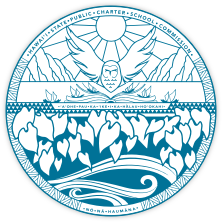HONOLULU, HI – The Hawaiʻi State Public Charter School Commission (“the Commission”) Early Learning Program was recognized for meeting nine of the ten high quality standard benchmarks identified by the National Institute for Early Education Research (NIEER) for the school year 2020-2021. The national ranking for these benchmarks is part of NIEER’s annual State Preschool Yearbook released this week. The ten standards serve as indicators of what’s required to establish a high-quality public preschool program. Nationally, only eleven-percent of children in preschool are in programs meeting nine of the 10 NIEER’s benchmarks for minimum quality.
The State Public Charter School Commission Interim Executive Director Yvonne Lau states, “The Public Charter School Early Learning Program continues to maintain high-quality early learning standards while providing high-quality early learning opportunities to our students in our communities that need them the most. We are humbled and proud of our schools for this achievement, especially given all of the challenges, including COVID-19. Building off the foundations afforded to us through the Federal Pre-K grants and now invested in our communities by our State, the State Public Charter School Early Learning Programʻs recognition by NIEER of the quality of our program is a testament to the commitment and perseverance of our schools to continue doing whatʻs best for our youngest learners.”
In 2014, Hawaiʻi was awarded a highly competitive four year federal Preschool Development Grant (PDG) administered by the Hawaiʻi State Public Charter School Commission. In comparison to other programs across the nation, Hawaiʻi was unique particularly since all preschool programs in charter schools offer some level of Native Hawaiian culture in their curriculum. Of the 17 preschool programs in charter schools, seven classrooms offer in depth instruction in Native Hawaiian language whereby the culture is learned through the immersion of the Hawaiian language and embedded throughout the instruction, and family engagement activities.
Since 2015, the Commission has worked with the State Legislature to sustain the public prekindergarten programs in charter schools following the sunset of the PDG federal grant. Through strong State legislative support, classrooms previously funded through PDG are now state-funded and under the administration of the Hawaiʻi State Public Charter School Commission.
Following national trends, one of the areas of challenge is the limited number of qualified teachers, which is exacerbated in rural remote areas. This is further magnified on the islands neighboring the main island of Oʻahu. Charter schools find it difficult to secure qualified teachers and when they do, these schools may lose them to other competing early learning programs. In 2017, the Commission had an opportunity to submit a proposal for additional PDG supplemental funding, focusing on areas not included in the original PDG grant proposal. In this supplemental proposal, the Commission addressed the need for workforce development, specifically assisting teachers and educational assistants to minimize the financial burden of college enrollment. The intent was to provide tuition subsidies to help with college coursework that led to a degree in early childhood education and teacher licensure. This program was open to all early childhood providers in the field, and was not limited to educators in charter schools. This addressed the systemic need for this type of program. In that one year, the Commission was able to assist 163 individuals with coursework. There continues to be a high demand for this type of financial support for the field. This program initiated by the Commission, led to potential state legislation to sustain these efforts.
Among other things, NIEER’s State Preschool Yearbook assesses and ranks state-run public preschool programs according to how much each state spends per student and the percentage of 3- and 4-year-olds the programs serve. Hawaiʻi ranks third for per-student state spending for all public prekindergarten program which includes charter schools and programs in the DOE. It ranks 44th for all 4-year-olds to have access to the public prekindergarten programs in Hawaiʻi State Public Charter Schools and the EOEL Public Prekindergarten Programs. The Hawaiʻi State Public Charter Schools were approved by the State Legislature to begin serving three-year-olds during the 2020-2021 school year. However the legislation was enacted after most of the classrooms were at full enrollment capacity.
The full 2021 State Preschool Yearbook is available online here.

